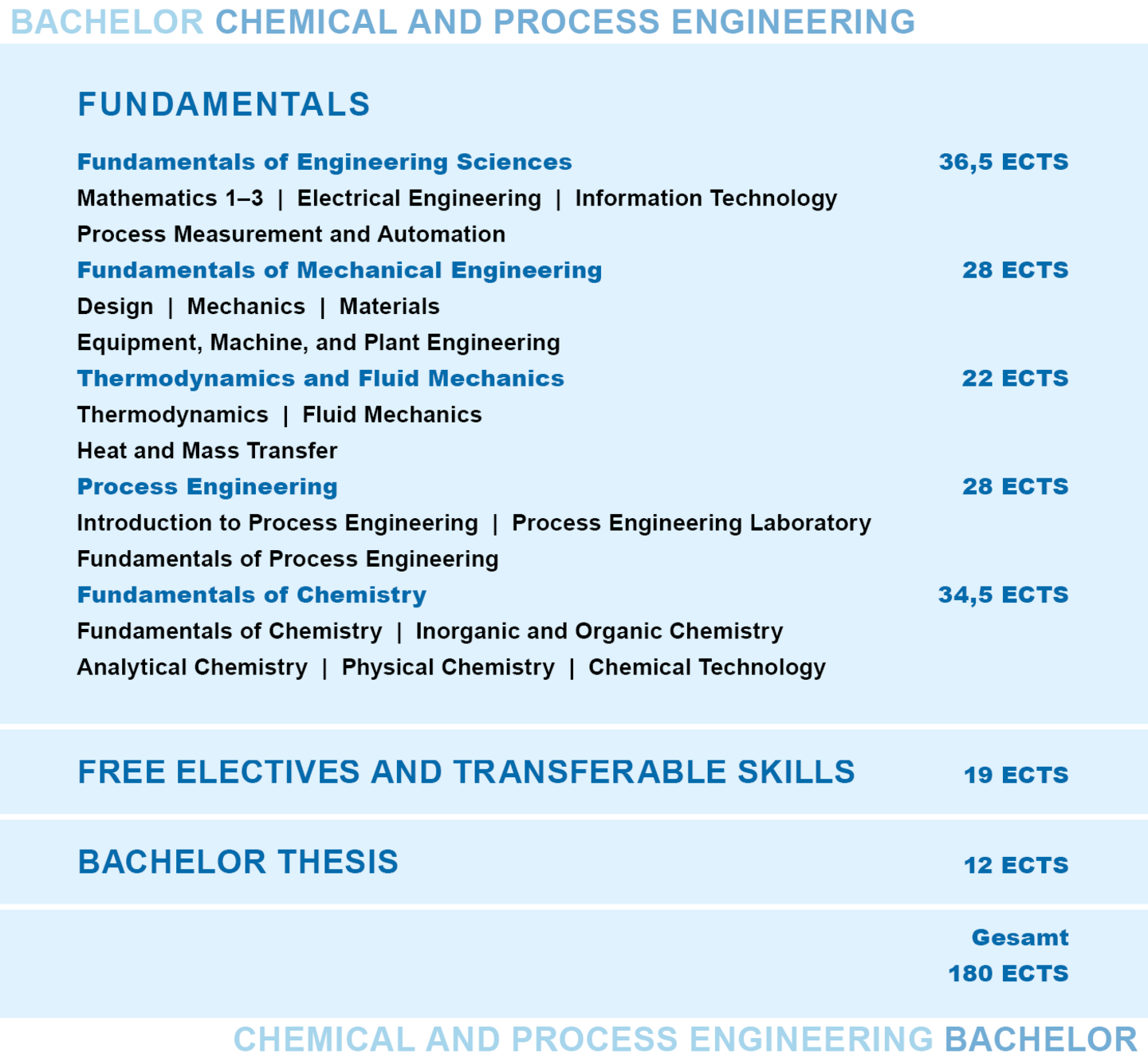
Bachelor’s Programme Chemical and Process Engineering
- Programme Code
-
UE 033 273 - Chemical and Process Engineering
- Duration of Programme
-
6 semesters
- Credits
-
180 ECTS
- Language
-
German
- Degree
-
Bachelor of Science (BSc)
- Curriculum
Programme contents
Chemical and process engineering is the science of material conversion – in other words, it is always required when a product is created from a raw material through physical, chemical or biological processes. For example, process engineering knowledge is needed to manufacture paper from wood.This interdisciplinary programme deals with the combination and further development of methods from chemistry or biology and mechanical engineering equipment.
This means that basic knowledge from various fields (disciplines) is required in order to understand and calculate the interaction of, for example, the speed of a chemical reaction in different reaction vessels (reactors) under different conditions such as pressure, temperature, flow behavior, etc.
The chemical and process engineering programme enables students to actively contribute to sustainable development and environmental protection. Since industrial processes and energy supply are largely responsible for environmental pollution, innovations in chemical and process engineering have great potential to reduce emissions, conserve resources and help shape the transition to a climate-friendly economy.
A special aspect of the programme is systems thinking: this involves looking at technical processes not in isolation, but understanding them in their interaction as a whole. In this way, chemical and process engineering procedures can be designed in an environmentally friendly, efficient and interdisciplinary manner and also evaluated in terms of their sustainability.
The friendly atmosphere between students and lecturers creates a pleasant working environment and facilitates good communication. Close cooperation with industry partners and research institutions gives the content a strong application-oriented focus. Graduates of this programme have a wide range of career prospects and are in high demand.
Programme-PRe-Phase
The Programme-PRe-Phase serves to discuss the choice of Bachelor's Programme and it is not a selection method. It is divided into two parts, which must be completed online before the admission:
- Online survey on the choice of Programme: It serves the purpose of self-assessment, reflection on the choice of Bachelor's Programme as well as for deepening the requirements and general conditions of the Programme.
- Feedback on the level of knowledge: This is intended to test the necessary basic mathematical knowledge. It serves to determine the current level of knowledge.
Further information about the programme
Enthusiasm and interest in developing technical solutions and processes for efficient and environmentally friendly production. Willingness to develop new methods and approaches both in the laboratory through experiments and through calculations and modeling.
Mathematical understanding and good spatial awareness are an advantage. Teamwork, curiosity, and creativity are among the key skills that future students of chemical and process engineering should have in order to be successful.
Apart from a general university entrance qualification (Matura), there are no formal requirements for admission. If descriptive geometry has not been completed as part of your school education, you must take an additional exam at TU Wien before completing your Bachelor's programme. Mathematical knowledge can be refreshed in the Harmonisation Course Mathematics – ECTS credits are also awarded for this course as part of the free elective subjects.
Apart from the formal conditions for admission, you do not have to meet any other requirements. You must register online in the campus software TISS, opens an external URL in a new window to participate in the Programme-PRe-Phase.
The admission takes place in the admission office of the TU Wien.
If you have any questions about your programme, you can contact the Student Union, opens an external URL in a new window and the Dean's Office of the Faculty of Mechanical and Industrial Engineering.
The programme content is divided into different modules. A module consists of individual or related courses. You must complete these in order to pass the module. Modules with similar topics are grouped together into examination subjects. These examination subjects appear on your final certificate with the overall grade you achieved at the end of your studies.
The scope of courses and modules is specified in ECTS credits. One ECTS credit represents 25 hours of work.

The Bachelor's Programme in Chemical and Process Engineering consists of the following examination subjects and modules.
The compulsory basic modules are:
- Fundamentals of Engineering Sciences: Mathematics 1-3, Electrical Engineering, Inforamtion Technology, Process Measurement and Automation
- Fundamentals of Mechanical Engineering: Design, Mechanics, Materials as well as Equipment, Machine, and Plant Engineering
- Thermodynamics and Fluid Mechanics: Thermodynamics, Fluid Dynamics, Heat and Mass Transfer
- Process Engineering: Introduction to Process Engineering, Process Engineering Laboratory, Fundamentals of Process Engineering
- Fundamentals of Chemistry: Fundamentals of Chemistry, Inorganic and Organic Chemistry, Analytical Chemistry, Physical Chemistry, Chemical Technology
In addition, you must complete 19 ECTS from a catalog of Free Electives and Transferable Skills.
Finally, you have to write your Bachelor's thesis.
More detailed information can be found in the curriculum in TISS, opens an external URL in a new window.
Climate change, resource scarcity, and water shortages are among the most pressing challenges of our time. Global challenges require technical solutions—and chemical and process engineering provides them.
Chemical and process engineers develop processes to reduce industrial CO₂ emissions, improve the recovery and recycling of valuable raw materials, and ensure that clean water remains available in the future through modern wastewater treatment.
The programme teaches the necessary skills, including the design of energy-efficient heat exchangers, the modeling and simulation of complex material and energy flows, and reaction engineering for sustainable chemical processes.
Chemical and process engineering thinks in terms of systems and creates the technical foundations for a sustainable and future-proof industry.
Thanks to the interdisciplinary training, a wide range of career opportunities are available. Process engineers have the necessary skills to understand complex processes, link different specialist areas, and develop sustainable solutions.
Traditional areas of application are the chemical, energy, pharmaceutical, construction materials, paper, and food industries. At the same time, future-oriented fields such as environmental technology, hydrogen economy, and recycling are becoming increasingly important.
Typical tasks include:
- Research and development
- Development and optimization of production processes
- Planning, construction, and commissioning of plants
- Operation, monitoring, and maintenance of process plants
- Project and plant management
- Safety engineering, accident prevention, and environmental protection
- Waste management and recycling
Job opportunities for graduates of chemical and process engineering at TU Wien are very good. The pay is attractive and can increase significantly with professional experience. Graduates have the opportunity to work in exciting and challenging areas that have a direct impact on technological development and environmental protection.
If you would like to study abroad, the chemical and process engineering programme at TU Wien offers great opportunities: There is a large network of partner universities where you can spend a semester or do an internship abroad. The courses you take there will count toward your programme. Advanced internships can also be done directly at companies, after consultation with the dean of studies. The only important thing is that the work there is related to chemical and process engineering.
For more information, visit https://www.tuwien.at/en/mwbw/dekanat, opens an external URL in a new window
The manageable number of students has many advantages: the teaching staff have more time for you and can provide you with excellent support. There is also plenty of space in the laboratories, so you can work without long waiting times. In the many laboratory exercises during the programme, you can try out, observe and apply what you have learned in theory.
The central location for students is the Getreidemarkt campus, which includes state-of-the-art laboratories, numerous seminar rooms, and the most important lecture halls for process engineers. The student council is also located on campus.
The programme is supervised by the following institutes:
- Institute for Chemical, Environmental and Bioscience Engineering
- Institute for Chemical Technologies and Analytics
- Institute for Energy Systems and Thermodynamics
- Institute for Engineering Design and Product Development
- Institute for Mechanics and Mechatronics
- Institute for Fluid Mechanics and Heat Transfer
- Institute for Materials Science and Technology
Once you have completed all the necessary courses and your final thesis has been graded, you can submit your Bachelor's Programme.
As a graduate of the Bachelor's Programme in Chemical and Process Engineering, you will be awarded the academic degree “Bachelor of Science” (BSc).
You can find out how to complete your programme on the page https://www.tuwien.at/en/mwbw/dekanat/graduation/graduating-from-a-bachelors-programme, opens an external URL in a new window.
TU Wien offers a Master's Programme in Chemical and Process Engineering for Sustainable Production (UE 066 473) that builds directly on the Bachelor's Programme in Chemical and Process Engineering. In addition, there is the option of enrolling in other relevant Master's Programmes at TU Wien or at other universities in Austria or abroad.
